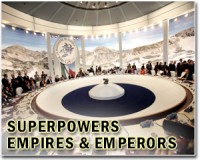| . |  |
. |
Copenhagen (AFP) Dec 12, 2009 They sang each other's praises in the run up to the Copenhagen climate summit, but China and the United States traded sharp barbs in a superpower standoff that has helped set the UN talks on edge. On key issues ranging from how to share out the burden of slashing greenhouse gases, whether such efforts should be independently verified, or if the United States owes developing countries -- including China -- a "climate debt," the world's two largest carbon polluters were at loggerheads. "The atmosphere seems extremely negative. Every one is taking tough positions, talking to their domestic audiences," said Isabel Hilton, editor of online environmental newsletter China Dialogue. "Its a big change of tone. Before coming, China made positive noises, even suggesting they were ready to announce a date at which their carbon emissions would peak," she told AFP. "But here they have been hanging very tough." In late November, China vowed to nearly halve the carbon intensity of its economy over the next decade, one of several major emerging economies to unveil emissions-curbing schemes ahead of the crunch the December 7-18 summit. In Copenhagen, however, Beijing seems to have dug in its heels, insisting on its status as a developing country no less a victim of the West's legacy of carbon-polluting industrialisation than the poorest of African nations. "The priority for the developing countries is still the reduction of poverty, is still economic development," insisted Chinese vice minister of foreign affairs He Yafei. The United States acknowledges the historical responsibility of rich nations for global warming, which has already begun to unleash devastating consequences around the world. At the same time, Washington -- which rejected the Kyoto Protocol precisely because it failed to do so -- has pushed China and other emerging giants to take on more ambitious targets. "The United States is not going to do a deal without major developing countries stepping up," US chief negotiator Todd Stern said Friday, pointing out that developing countries are projected to account for 97 percent of global emissions within four decades. "If we are talking about the need to keep the temperature increase below 2.0 degrees Celsius" -- widely seen as the threshold for dangerous warming -- "you can't even have that discussion if the major developing countries are not taking a major role," he said. China, for its part, has ridiculed the US offer to cut CO2 output by 17 percent from a 2005 benchmark as puny, and a far cry from the levels called for by science. Part of the standoff is negotiating bluster, said Jennifer Haverkamp, managing director of Washington-based Environmental Defense Fund. "These negotiators have not only their ministers coming, by their uber-bosses -- heads of state -- showing up in a few days, so the pressure is enormous to reach a deal," she told AFP. "If sharp words get into the public conversation, that is a reflection of the fact that stakes are high, emotions are high." But it also reflects, analysts say, a genuine -- and yawning -- gap on key issues. Two of the most contentious are finance and international monitoring. Vice minister He said he was "shocked" that Stern had two days earlier rejected the notion that developing countries were owed a "debt" or "reparations." "We are not asking for donations. Industrialised countries have a legal obligation -- the US included. Whoever created the problem is responsible," said He. "The Chinese don't use the word 'reparations', but they do talk about the US 'carbon debt' to China," noted Hilton. Beijing has also objected to the US insistence that even if developing country efforts to stem global warming remain voluntary, they should be independently measured, registered and verified -- "MRVed" in climate change lingo. "It doesn't mean China will not do what it promises," said He, adding that China's own legal guarantees and verification procedures were adequate. "But there is no MRV internationally because it is a matter of principle." At pains to burnish its status as a "developing country", China has also come under pressure from poorer nations who see their interests diverging from the Asian giant with which they have been long been aligned in the G-77. "The vulnerable and poor states look at China's per capita carbon footprint and see that it is well above India, and the global average," Hilton observed. "At what point do we say to China 'you have graduated', you are no longer a developing country? China is trying to defend that position as long as possible," she said. Share This Article With Planet Earth
Related Links Learn about the Superpowers of the 21st Century at SpaceWar.com Learn about nuclear weapons doctrine and defense at SpaceWar.com
 Obama garners rare unified praise for Nobel speech
Obama garners rare unified praise for Nobel speechWashington (AFP) Dec 11, 2009 In a rare of display of unity, lawmakers and pundits from across the US political spectrum on Friday offered praise for President Barack Obama's Nobel Peace Prize acceptance speech. With few exceptions, the address was received as a masterful defense of US policy, including the two wars Obama presides over even as he became a Nobel laureate. Some of Obama's fiercest critics, including fo ... read more |
|
| The content herein, unless otherwise known to be public domain, are Copyright 1995-2009 - SpaceDaily. AFP and UPI Wire Stories are copyright Agence France-Presse and United Press International. ESA Portal Reports are copyright European Space Agency. All NASA sourced material is public domain. Additional copyrights may apply in whole or part to other bona fide parties. Advertising does not imply endorsement,agreement or approval of any opinions, statements or information provided by SpaceDaily on any Web page published or hosted by SpaceDaily. Privacy Statement |